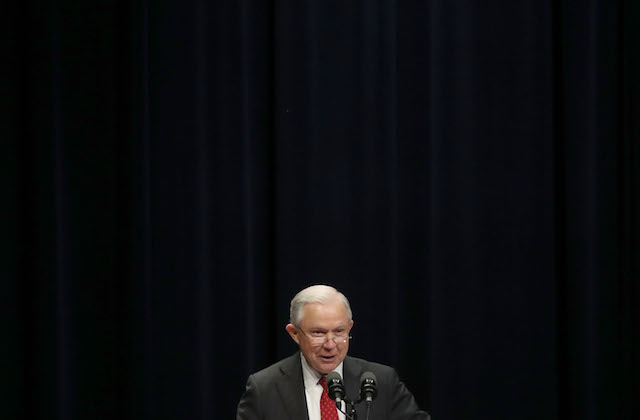Attorney General Jeff Sessions, who has been been accused of being racist throughout his career, sparked fresh backlash on Monday (February 12) when he referred to United States sheriffs as a "critical part of the Anglo-American heritage of law enforcement" during a meeting of the National Sheriffs’ Association in Washington D.C.
"The office of Sheriff is a critical part of the Anglo-American heritage of law enforcement. We must never erode this historic office" : Attorney General Jeff Sessions speaking at the National Sheriff’s Association winter conference in DC. @vicenews pic.twitter.com/gPS6AbkS30
— Tess Owen (@misstessowen) February 12, 2018
Sessions’ remark appeared to be spontaneous, as it was not in his prepared speech, which read, in part: "Since our founding, the independently elected sheriff has been seen as the people’s protector, who keeps law enforcement close to and amenable to the people. The sheriff is a critical part of our legal heritage."
The NAACP immediately denounced the remarks as Session’s latest espousal of bigotry. In a written statement to The Washington Post, the civil rights group said: "His decision to link the term sheriff to some part ‘of the Anglo-American heritage of law enforcement,’ is an unfortunate yet consistent aspect of the language coming out of the Department of Justice under his tenure and in the opinion of the NAACP, qualifies as the latest example of dog whistle politics."
The organization strongly opposed Sessions’ nomination as the nation’s top cop by questioning his support for police accountability and the rights of women and immigrants.
On Monday, Sessions supporters defended the attorney general from accusations of racism, noting that the term "Anglo-American law" is commonly used in legal circles as a synonym for "common law." The Post noted that references to the "Anglo-American" legal system are common in case law, and that a slew of Supreme Court justices, both liberal and conservative, have used variations of the term in the past.
And Bill Baer, a deputy associate attorney general under Barack Obama, used the term in 2016 during a speech delivered in China. Baer said, in part: "Justice Kennedy of the U.S. Supreme Court spoke on this subject to the Hong Kong High Court in February 1999. There, he described 1000 years of evolution of rule of law and of the Anglo-American common law system."
But as some critics noted, the meaning of the term "Anglo-American heritage" used by Sessions yesterday and "Anglo-American legal system" are not the same, especially given Sessions’ complicated history with the Civil Rights Movement.
Some said that Sessions’ comments reinforced concerns about White House support for White supremacy, and the racial controversy that has marked the attorney general’s career.
"Sessions’ comments make explicit what has long been known: this administration sees its support for law enforcement and its support for White supremacy as part of the same agenda," Judith Browne Dianis, executive director of racial justice nonprofit Advancement Project, said in an emailed statement. "Sessions and Trump have frequently used the language of ‘public safety’ to justify the administration’s racist policies, from their targeting of Black activists, to their undermining of police reform efforts, to their racial purge of immigrants of color."
In 1986, the Senate Committee on the Judiciary rejected Sessions’ nomination for the U.S. District Court for the Southern District of Alabama following accusations from fellow prosecutors that Sessions had, as attorney general of Alabama, prosecuted Blacks on trumped-up voter fraud charges and repeatedly referred to a Black assistant as "boy." Other former colleagues testified that Sessions regularly used the n-word and said he thought the Ku Klux Klan were "okay, until he learned that they smoked pot."
Civil rights groups on Monday also framed Sessions’ remarks within the historical mistrust between law enforcement and Black communities, noting that police forces actively participated in lynching during the Reconstruction.
As crime historian Gary Potter told Time last year, police departments were created in the South to preserve the institution of slavery, with slave patrols created to chase down runaway enslaved people and prevent revolts.
